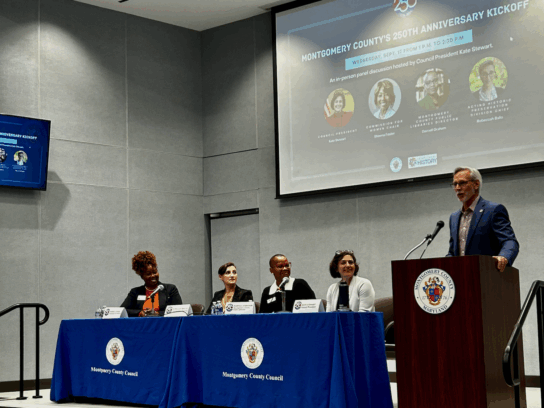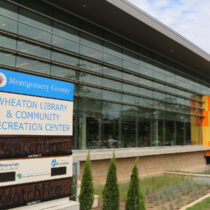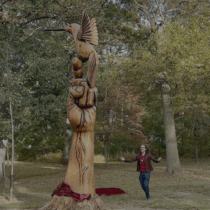
Amid a nationalist leaning federal administration that squarely puts “America First,” Montgomery County leaders said that’s fine, as long as it includes all Americans, and the Indigenous populations, too.
Plans for the county’s yearlong celebration of a milestone anniversary of its 1776 founding next year, which coincides with the founding of the United States 250 years ago, were announced Wednesday afternoon amongst a diverse crowd of local leaders before a panel discussion hosted by Council President Kate Stewart. She was joined by panelists from the county’s Historic Preservation office, its Commission for Women and Montgomery County Public Libraries.
Panelists emphasized the need to preserve underrepresented voices in the county’s re-telling of its 250 years. Named after Irish-born Richard Montgomery, the county was started when a member of Maryland’s Constitutional Convention, a Dr. Thomas Sprigg Wootton, introduced a bill to the Maryland General Assembly to divide Frederick County into three smaller counties: Frederick, Washington, and Montgomery, according to county documents. The bill passed on Sept. 6, 1776.
But the panelists focused on weaving more Native American, African American, Latinx and LGBTQIA+ stories into the fabric of Montgomery County’s storytelling about its 250 years of existence, from books that can be found at libraries to the historical preservation placards that can be found outside of longstanding homes and buildings.
“When they’re [the federal government] trying to remove our history from our museums, our children’s learning … Montgomery County is doing a wonderful job preserving stories. Where we can do better is underrepresented stories,” said Darcell Graham, director of Montgomery County Public Libraries.
Meanwhile, Rebeccah Ballo, the acting chief of the Historic Preservation Division for the county noted that her work requires a special awareness and intention. “We need to continue to push ourselves to ask: ‘Whose stories are not being told here?’,” said Ballo.
Panelist Sheena Foster serves in an appointed position as Chair of the Commission for Women for Montgomery County. She said she has worked in the National Park Service for two decades and warned that failing to keep records means, “Our history is erased.”
She pointed to the Sugarland community of formerly enslaved people as an example: “If it were up to folks outside this county, that [Sugarland] book wouldn’t exist,” said Foster The conversation also highlighted what the county’s identity means to residents.
When Council President Stewart asked the room, “What does Montgomery County mean to you?” Foster, a DMV transplant from Louisiana, gave a flavorful response that warmed the rather sparse, dimly lit auditorium at the Maryland Avenue Council Building where the event took place.
“Living in a county that has four of the most diverse cities in the United States … it kind of reminds me of home … it’s kind of like gumbo. It feels like soul food,” Foster mused.
Plans for the 250th include countywide events, a video contest, programming from Montgomery Parks, and public celebrations at library branches, which are also marking their 75th anniversary.
Montgomery History, the county’s historical society, announced it will launch “The Unfinished Revolution” initiative, host an historical conference at Montgomery College November 8 and open a new county history center in summer 2026. The Commission for Women will host an event January 31.
“This is a really exciting time for our local history—but for all people,” said Matthew Logan, executive director of Montgomery History.


Comments are closed.